Blog
SCOTUS Rules "No One Can Own The Law" - Georgia v. Public.Resource.Org, Inc.
The Supreme Court issued a 5-4 opinion on April 27, 2020 in the case Georgia v. Public.Resource.Org, Inc. The case considered whether annotations that summarize and provide further context to the law are copyrightable, particularly when the annotated version of the law is the official code. The decision ruled in favor of Public.Resource.Org which argued that copyright protections do not extend to the Official Code of Georgia Annotated.
In the majority opinion, Chief Justice Roberts held that the "government edicts doctrine," the doctrine that precludes copyright protection of judicial opinions and statutes, also applies to the annotations prepared and adopted by the legislature. Roberts stated, “If judges, acting as judges, cannot be “authors” because of their authority to make and interpret the law, it follows that legislators, acting as legislators, cannot be either” (p.8).
Two dissenting opinions were filed. Justice Thomas filed a dissenting opinion joined by Justice Alito and Justice Breyer, and Justice Ginsburg's opinion was joined by Justice Breyer. Both dissenting opinions concluded that the annotations fall outside of the scope of the government edicts doctrine. In his dissent, Justice Thomas wrote, "This ruling will likely come as a shock to the 25 other jurisdictions—22 States, 2 Territories, and the District of Columbia—that rely on arrangements similar to Georgia’s to produce annotated codes" (p.1). In Pennsylvania, the annotated version of the statutes is unofficial, therefore it is not included in the 22 states mentioned. For more information on the organization of Pennsylvania's statutes, see our PA Statutes research guide.
Several library associations including the American Association of Law Libraries filed an amicus brief in support of Public.Resource.Org, Inc. The associations explained to the court "how libraries rely on the government edicts doctrine to provide access to, and preserve, official legal materials" (p.1).



